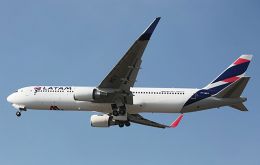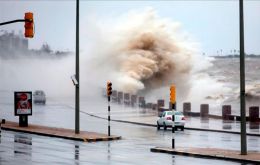MercoPress. South Atlantic News Agency
Stories for April 2022
-
Friday, April 8th 2022 - 09:48 UTC
Falkland Islands Government seeks to resume air links with Chile from July

Following the announcement last month, concerning the relaxation of COVID-19 measures in the Falkland Islands, the government is now seeking to resume the airlink with Chile from 2 July 2022, provided that all necessary permissions are granted and mainland airports are open.
-
Friday, April 8th 2022 - 09:46 UTC
Gibraltar joins commemoration of 40th anniversary of Falklands conflict

As part of the commemorative plans for the 40th anniversary of the Falklands Islands conflict, Gibraltar Cultural Services on behalf of the Ministry of Culture, will be hosting a series of lectures. 2022 marks 40 years since the end of the conflict.
-
Friday, April 8th 2022 - 09:44 UTC
Argentina's Ambassador to Israel sentenced to 8 years for corruption

Argentina's Ambassador to Israel and Cyprus Sergio Uribarri has resigned after being sentenced to 8 years in jail for “embezzlement and negotiations incompatible with public office.”
-
Friday, April 8th 2022 - 09:24 UTC
Brazil records first case of COVID-19 due to XE variant

A 39-year-old patient in the Brazilian city of São Paulo has been determined to arguably be the first in the region with the Omicron XE variant of coronavirus.
-
Friday, April 8th 2022 - 09:19 UTC
Venezuela's monthly inflation stays within one-digit figures

Venezuela's economic authorities have reported one-digit monthly inflation once again for a country that had grown accustomed to astronomic figures. However, independent observers consider this data to be absurd.
-
Friday, April 8th 2022 - 09:11 UTC
Argentina's Atlantic air corridor back as of July

Aerolíneas Argentinas has announced the resumption of the so-called “Atlantic Corridor” starting in July.
-
Thursday, April 7th 2022 - 09:58 UTC
Uruguay takes action as climate change threatens waters will advance on coastline

Uruguay's Environment Ministry has launched the National Climate Change Adaptation Plan for the Coastal Zone (PAN Costas) to increase resilience to a rise in the level of the sea, resulting from climate change.
-
Thursday, April 7th 2022 - 09:56 UTC
Latin American focus, support for Argentina's Falklands' claim and diplomacy to solve continental shelf disputes, Boric's agenda

Chilean president Gabriel Boric in his recent visit to Argentina stated some of the basic pillars of the new administration's foreign policy, focused mainly on Latin America, human rights, support for Argentina's claim over the Falklands, and willingness to address border disputes its neighbor through diplomacy and patience.
-
Thursday, April 7th 2022 - 09:47 UTC
Website Declassified UK poll shows 49% believe Argentina should assert sovereignty over the Falkland/Malvinas

Investigative journalism website Declassified UK has published the results of a poll on its social media with only 21% stating that the UK should keep the Falkland Islands while an overwhelming 49% believe in Argentine sovereignty for the Malvinas Islands.
-
Thursday, April 7th 2022 - 09:40 UTC
Billions of people breathe unhealthy levels of fine particulate matter and nitrogen dioxide, WHO report

Almost the entire global population (99%) breathes air that exceeds WHO air quality limits and threatens their health. A record number of over 6000 cities in 117 countries are now monitoring air quality, but the people living in them are still breathing unhealthy levels of fine particulate matter and nitrogen dioxide, with people in low and middle-income countries suffering the highest exposures.
